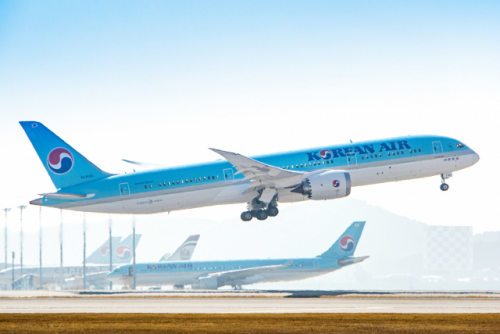Operating profit recorded even though sales decreased by 40%
Thanks to the cargo business sector and cost reduction efforts
Continue to operate flexible cargo planes and transport vaccines
 viewer
viewer
Korean Air recorded a business surplus last year, even with the prolonged coronavirus infection (Corona 19). This is thanks to improved performance through asset sale, cost reduction, and cargo transportation, even though passenger operations were suspended due to the blockage of international flights.
On the 4th, Korean Air disclosed its provisional operating results for 2020, including sales of KRW 7.45 trillion, operating profit of KRW 238.3 billion, and net loss of KRW 228.1 billion.
Overall sales decreased by 40% compared to the previous year due to the decrease in passenger demand due to Corona 19. In particular, passenger sales fell 74% compared to the previous year. However, thanks to the strategy of increasing the utilization rate of cargo planes and actively utilizing idle passenger planes, cargo sales recorded KRW 4.25 trillion. It has increased by 66% compared to 2019 (2.557 trillion won). Demand for Corona 19 diagnostic kits and auto parts increased, and some shipping demand was driven by air transport, leading to an increase in air freight sales.
Operating profit turned to the black due to efforts to improve productivity and reduce costs in the cargo division and across the company. Fuel consumption and aviation fuel costs have decreased due to a decrease in passenger supply and oil prices, and related expenses such as facility usage fees have decreased due to a decrease in passenger operations. In the case of the cargo business, transportation of the Belly (cargo compartment under the passenger plane), which accounts for a large portion of the cargo supply, has decreased due to a sharp decline in passenger plane operations.
In addition, while using idle passenger aircraft, it increased its supply power by converting and operating a passenger aircraft into a freighter for the first time in Korea. In addition, as employees went into rotational closure, labor costs also decreased somewhat. Employees are closed from April last year to the end of the year.
Last year, net loss of 228.1 billion won was incurred due to the impact of net interest expenses, but the loss was significantly reduced compared to the previous year (5687 billion won).
In addition, Korean Air is expanding its capital and improving its constitution through preemptive self-reliance efforts such as asset sales after Corona 19. Last year, it successfully carried out a paid-in capital increase of 1.11 trillion won, and sold the in-flight meal board business for 9817 billion won. The sale of Wangsan Leisure Development and Kalimujin is also in the final stage. Along with this, the company is steadily promoting the sale of shares of Hanjin International, which operates the Wilshire Grand Center in Los Angeles, USA, and the sale of the Songhyeon-dong site with the Seoul Metropolitan Government.
This year too, Korean Air is planning to overcome the crisis and accelerate the improvement of its constitution based on its own efforts. It plans to successfully proceed with a paid-in capital increase of 3.300 trillion won, scheduled for March this year, to secure liquidity and improve financial structure by expanding capital, while also solving the problem of financing for Asiana Airlines’ acquisition. Along with this, the post-acquisition integration (PMI) for Asiana Airlines integration will proceed without a hitch.
However, due to the uncertainty caused by Corona 19, the circular closure of employees continues this year. In addition, we will continue to discuss the sale of the site in Songhyeon-dong, the core of Jaguan.
A Korean Air official said, “It is a plan to reinforce the current air cargo business strategy by resiliently controlling air cargo supply and proactively responding to changes in the market environment.” “We will start shipping vaccines in earnest starting in the second quarter of the year.”
/ Reporter Park Si-jin [email protected]
< 저작권자 ⓒ 서울경제, 무단 전재 및 재배포 금지 >
